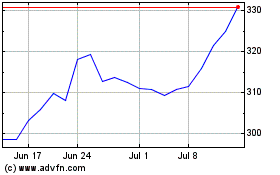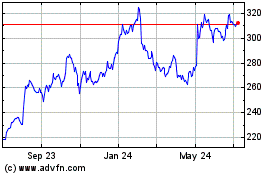Amgen To Invest In Chinese Biotech -- WSJ
November 01 2019 - 3:02AM
Dow Jones News
By Allison Prang and Jared S. Hopkins
This article is being republished as part of our daily
reproduction of WSJ.com articles that also appeared in the U.S.
print edition of The Wall Street Journal (November 1, 2019).
U.S. drugmaker Amgen Inc. said it is buying a roughly 20% stake
in a Chinese biotechnology company for $2.7 billion in cash,
further demonstrating China's emergence as a key market for foreign
pharmaceutical companies.
Amgen said BeiGene Ltd., a Beijing-based company focused on
oncology, is going to commercialize certain Amgen treatments in
China and will split those earnings or losses.
BeiGene will take three different Amgen products to market:
Xgeva, a prescription bone treatment; Kyprolis, a treatment for
myeloma; and Blincyto, a leukemia treatment.
BeiGene will ultimately be able to retain the rights to one of
those treatments and earn royalties on the others for an additional
five years after the commercialization period, Amgen said. Amgen
said Xgeva was introduced in China last month. The other two
treatments are in Phase III trials.
BeiGene and Amgen also will collaborate on 20 of Amgen's
oncology medicines. Amgen said that BeiGene will help cover
expenses for research and development "and contribute up to $1.25
million to advance these medicines."
Amgen expects the deal to close early next year.
China has increasingly been approving foreign drugs, following a
series of policy moves by China to provide its huge population with
new treatments, particularly those that treat cancer. Merck &
Co. earlier this week reported that sales grew by 90% in China
during the third-quarter. AstraZeneca Chief Executive Pascal Soriot
said last year that he expected China to eventually overtake Europe
as the company's second-largest market. The merger of Pfizer Inc.'s
off-patent drug business, Upjohn, with Mylan NV offered Mylan
expanded geographic reach in China where Upjohn has a strong
presence.
For Amgen, BeiGene's experience with the changes to China's
health care, including advancing products through the country's
revised reimbursement programs, helped make it an attractive
partner, according to Murdo Gordon, Amgen executive vice president
for global commercial operations. Amgen was also impressed with the
commercial infrastructure of BeiGene, which was founded in 2010 and
markets three products in China.
"They're really in a good position," Mr. Gordon said in an
interview.
International expansion has been the company's goal for about
five years, with Asia a critical component, Dave Reese, Amgen's
research and development chief, said in an interview.
"This deal puts into place the last missing piece of the puzzle
in terms of that geographic expansion," Dr. Reese said.
Earlier this year, Amgen began selling its first drug in China,
the cholesterol-lowering treatment Repatha. "The performance there
has exceeded our expectations," Mr. Gordon said, noting additional
products are expected to launch in China.
Amgen, based in Thousand Oaks, Calif., recently agreed to buy
Celgene Corp.'s psoriasis medicine Otezla for $13.4 billion. Amgen
has been under pressure recently by the introduction of copycats to
its white-blood-cell booster Neulasta and calcium reducer
Sensipar.
Write to Allison Prang at allison.prang@wsj.com and Jared S.
Hopkins at jared.hopkins@wsj.com
(END) Dow Jones Newswires
November 01, 2019 02:47 ET (06:47 GMT)
Copyright (c) 2019 Dow Jones & Company, Inc.
Amgen (NASDAQ:AMGN)
Historical Stock Chart
From Mar 2024 to Apr 2024

Amgen (NASDAQ:AMGN)
Historical Stock Chart
From Apr 2023 to Apr 2024
